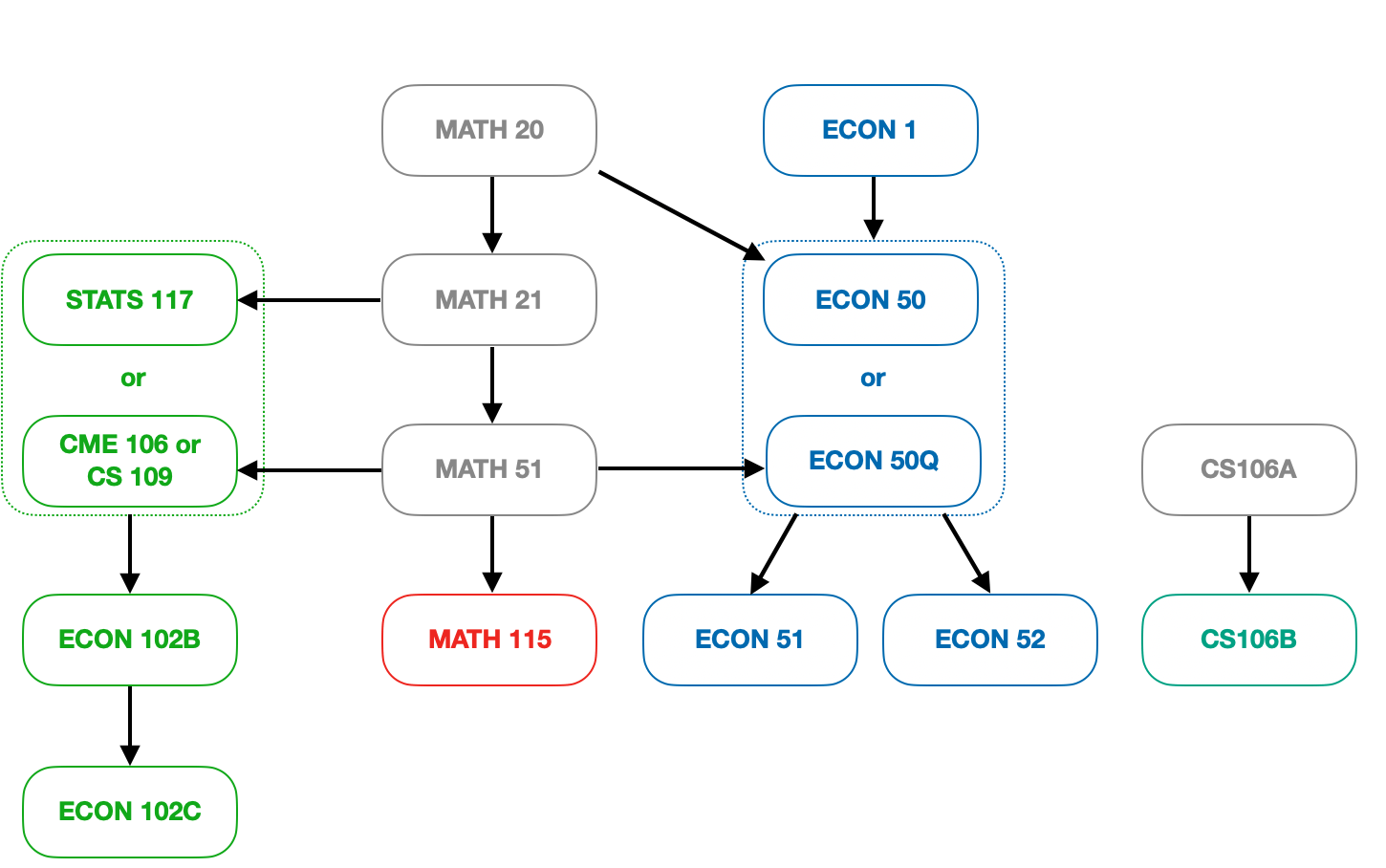pollev.com/chrismakler

Today's Attendance Question
What song is playing right now?
Please be fully present in lecture.
No phones.
No tablets.*
No laptops.
* If you want to take notes on an iPad, please sit up front.
Penalty for violations:
I will cold call you on the next question.
Welcome to Econ 50
Christopher Makler
Stanford University Department of Economics
Econ 50: Lecture 1
Today's Agenda
Introductions
Why Econ 50?
New for 2024!
Course Structure and Policies
Course Overview
Plan for the rest of the week
Introductions
Chris Makler
- B.A.: Humanities, Yale
- Ph.D.: Economics, Penn
(search & matching theory)
- 10 years in the education technology industry
- Teaching Econ 50 & 51 since 2015
- Office: Landau Econ Building, Room 144
Welcome to Econ 50!

pollev.com/chrismakler

What are you planning on majoring in?
pollev.com/chrismakler

Why are
you here?
Why?
Econ 50 is a prerequisite for
nearly every other Econ course,
and required by a bunch of other departments.
Ways to Think about Learning
Strategic:
"knowing when" - given an unstructured problem, which model/framework is most relevant?
Schematic:
Procedural:
Declarative:
"knowing why" - how do different concepts/models relate to one other?
"knowing how" - given a well-defined problem, ability to follow correct procedure to solve it
"knowing that" - facts and figures, vocabulary
Goals of the Course
Strategic:
Develop rigorous approach to economic modeling; understand how assumptions map into conclusions.
Schematic:
Procedural:
Declarative:
Understand the relationships between
words, math, and graphs.
Learn the techniques of
optimization, equilibrium, and comparative statics.
Know the definitions of key economic terms.
The overall goal of this course is to prepare you
for all the courses -- and jobs -- that build upon this material...
...by providing you with technical training to solve problems...
...and the ability to take an unstructured situation in the real world
and convert it into a structured, solvable problem.

It's not about the particular models
we're looking at in this class.
It's about learning how to use
the "building blocks" of economic models
to construct models of things you're interested in.
50 vs. 50Q
BA vs. BS
New for 2024!
Spring 2025 Redesign
Should you even be here?


B.A. Core Requirements
B.S. Core Requirements
You may take either 50 or 50Q and still choose to declare as a B.S.
You need to take more rigorous math and statistics courses for the B.S.:
specifically, Econ 102A is not a Core course for the B.S.!
Course Structure and Policies
Before Lecture
- Read the textbook and take online quizzes on the major points to be prepared for learning in lecture
Lecture
- Presents new ideas
- Illustrate those ideas with simple examples
After Lecture
- Exercises for each lecture are designed to help you understand nuance
- More complex examples and applications than in lectures; work on connecting the dots
After Each Unit
- Exam questions will ask you to apply concepts from lecture to new situations you haven't seen before.
Pre-Class Quizzes and In-Class PollEverywhere (10% of your grade)
-
Purpose: get the most out of lecture, by providing incentives to
read the textbook before class and be fully present during class -
Each category counts for 5% of your grade.
-
Each category has a 20 percentage point "boost":
if you get 80% or more right becomes 100%, 70% becomes 90%, etc. -
Realistically, as long as you come to most classes and put in effort
into each of the quizzes, these don't affect your grade. -
You do not need to email me if you're going to miss class.
You cannot "make up" PollEverywhere points.
Just make every effort to make it to every class you can.
pollev.com/chrismakler

If you're going to miss class, what should you do?
Homework (25% of your grade)
-
Due every Saturday.
-
Each exercise (including old exam questions) is worth 3 points.
- The grade is a message:
-
3 points (check-plus): You've got this!
-
2 points (check): You should review the solution set.
-
1 point (check-minus): You should review this material.
-
-
You do not have to do them all. Recommend doing 1-2 problems for each lecture.
-
Full credit (100 points total) for 10 points per problem set.
-
Maximum 14 points per problem set.
-
No homeworks accepted after 8am morning after due (automatic grace period until then)
-
You must assign pages in Gradescope to get your work graded!
pollev.com/chrismakler

If you don't have much time for homework, what should you do?
Midterm Exams (30% of your grade)
-
Mondays of Weeks 5 and 8
-
Meant to be a way for you to solidify material, self-assess, and keep on track
-
Two exams means that the stakes are lower for each one than if we had one "killer midterm:"
-
Higher score is 20% of your grade
-
Lower score is 10% of your grade
-
-
Note: if you miss both midterms, you must drop the class. Do not skip the first test for sure — assume you will get COVID for the second exam, which will prevent you from taking it.
Final Exam (35% of your grade)
-
Friday, December 13 at 8:30am (set by University)
-
You must take the exam here in person unless you're traveling on Stanford business; sorry.
-
If you have to miss the final due to illness or emergency, you may take an Incomplete only if:
- You scored a C or better on at least one midterm, AND
- You have a (curved) score of at least 80% on your quizzes and PollEverywhere grades (so a raw score of at least 60%), AND
- Your homework score is at least 80 points
Monday, November 11
Midterm 2
Monday, October 24
Midterm 1
Friday, December 13
Final Exam
8:30am
THESE ARE THE EXAM DATES.
DO NOT SCHEDULE ANYTHING THAT FORCES YOU TO MISS AN EXAM!!!
PUT THEM IN YOUR CALENDAR.
Course Web Sites
All content is posted/linked within Canvas.
Each week has its own module with everything you need to know about that week.
Please use Ed Discussions to ask questions (not email).
Please submit homeworks via Gradescope.
Helpful videos from UCSD are available for free, courtesy of UCSD.
Link in the syllabus; videos corresponding to each class will be posted on the syllabus and on ED.
Advice for You from Former Students (from course evals)
"Be prepared for the psets to be fairly more difficult than the examples worked out during lecture.
Sometimes there might be a disconnect between lecture and psets, too."
| "Class is difficult, but there are so many resources available to help you. Make use of office hours." |
"It's a lot of work, but if you stay on top of it, you'll be fine.
Definitely recommend doing all the psets and as many past exam questions as you can.
Makler's exam kinda made me want to cry, but everyone walked out kinda wanting to cry, so it's okay, probably."
"Organized, streamlined, and despairingly efficient.
This class crunches through concepts and ideas faster than you can get a good grip of them.
Makler is very approachable with questions, however, even if he memes on us a lot."
"...If you can, take the course together with your friends; they may be a great resource in helping you
grasp the course concepts! If you decide to take ECON 50, I hope you have a great time
and that you find a close-knit community of fellow enthusiasts of Economics."
The Small Print
- Names and pronouns
- Students with documented disabilities
- Stanford University Honor Code
- Econ Department syllabus
- Humor gone wrong
Office Hours
- Come to office hours! Starting later this week...watch ED for details.
- Try your hand at the homework before coming to office hours; don't just come and do the homework in front of me. Then come with points of confusion and we'll talk through it.
Course Overview
Far out in the uncharted backwaters of the unfashionable end of the western spiral arm of the Galaxy lies a small unregarded yellow sun.

SCIEPRO/GETTY IMAGES
Orbiting this at a distance of roughly ninety-two million miles is an utterly insignificant little blue green planet whose ape-descended life forms are so amazingly primitive that they still think digital watches are a pretty neat idea.
This planet has — or rather had —
a problem, which was this:
😢
most of the people on it were unhappy for pretty much of the time.
Many solutions were proposed
for this problem...

...but most of these were largely concerned with the movements
of small green pieces of paper,
which is odd because on the whole
it wasn't the small green pieces of paper that were unhappy.


Resources
Technology
Stuff
Happiness
🌎
🏭
⌚️
🤓
Part I:
The Real Economy
Demand
Supply
Equilibrium
🤩
🏪
⚖
Part II: Little Green
Pieces of Paper
Three Fundamental Tools of Analysis
Optimization
Given a fixed set of circumstances (prices, technology, preferences), how do economic agents (consumers, firms) make choices?
Comparative Statics
How do changes in circumstances (changing prices, shifting technology, preferences, etc.) translate into changes in behavior?
Equilibrium
How do economic systems converge toward certain outcomes?
Plan for the Week
- Wednesday: Review of Univariate Calculus
No quiz; do Khan Academy unit tests instead as needed. - Section (Wednesday and Thursday):
Practical Introduction to Multivariate Calculus - Friday: Lecture on multivariable calculus
Quiz will be posted - Saturday: Homework 1 due
Econ 50 | Lecture 01
By Chris Makler
Econ 50 | Lecture 01
Welcome to Econ 50
- 707



